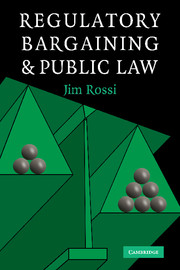Book contents
- Frontmatter
- Contents
- Preface
- Acknowledgments
- 1 The Scope of Regulatory Bargaining
- PART I EXTENDING INCOMPLETE BARGAINS FROM THE ECONOMICS OF THE FIRM TO PUBLIC GOVERNANCE
- PART II INCOMPLETE REGULATORY BARGAINS, INSTITUTIONS, AND THE ROLE OF JUDICIAL REVIEW IN DEREGULATED INDUSTRIES
- 5 Deregulatory Takings and Regulatory Bargaining
- 6 Incomplete Regulatory Tariffs and Judicial Enforcement
- 7 Bargaining in Decentralized Lawmaking
- 8 Overcoming Federal–State Bargaining Failures
- 9 Conclusion: Incomplete Regulatory Bargaining and the Lessons for Judicial Review
- References
- Index of Primary Legal Authorities
- Subject Index
7 - Bargaining in Decentralized Lawmaking
Published online by Cambridge University Press: 11 July 2009
- Frontmatter
- Contents
- Preface
- Acknowledgments
- 1 The Scope of Regulatory Bargaining
- PART I EXTENDING INCOMPLETE BARGAINS FROM THE ECONOMICS OF THE FIRM TO PUBLIC GOVERNANCE
- PART II INCOMPLETE REGULATORY BARGAINS, INSTITUTIONS, AND THE ROLE OF JUDICIAL REVIEW IN DEREGULATED INDUSTRIES
- 5 Deregulatory Takings and Regulatory Bargaining
- 6 Incomplete Regulatory Tariffs and Judicial Enforcement
- 7 Bargaining in Decentralized Lawmaking
- 8 Overcoming Federal–State Bargaining Failures
- 9 Conclusion: Incomplete Regulatory Bargaining and the Lessons for Judicial Review
- References
- Index of Primary Legal Authorities
- Subject Index
Summary
When a federalist system allocates decision-making power between national and state governmental bodies, while also disfavoring federal regulation of an activity, bargaining is often relegated to the spheres of state and local politics. In the United States, the preference for state or local regulation in many industries, including electric power and telecommunications, is largely historical and may not survive the next century if true national markets emerge – and especially if Congress and federal regulators take serious actions to establish these markets. As long as state and local regulation continues to play a major role in these industries, however, firms in deregulated markets will often find themselves in situations in which there is a jurisdictional gap (i.e., no regulation of private conduct) or in which there is concurrent jurisdiction between the federal and state agencies (i.e., two or more potential regulators). Such gaps and overlaps not only present challenges (and some opportunities) for regulators, but also allow private firms many opportunities for strategic manipulation of forum in bargaining for regulation. As the filed tariff doctrine illustrates, the regulatory void presented by gaps and concurrent jurisdiction can encourage private firms to make tariff filings or to add tariff terms to the regulatory contract that suit their private interests, leading to particularly worrisome forum selection implications under the filed tariff doctrine where regulators lack jurisdiction or do not actively evaluate the content of tariffs. Ideally, Congress will establish a truly national market by detariffing electric power, as it has telecommunications.
- Type
- Chapter
- Information
- Regulatory Bargaining and Public Law , pp. 172 - 205Publisher: Cambridge University PressPrint publication year: 2005



